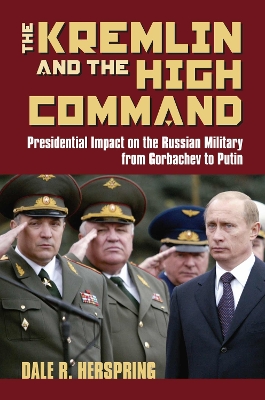Modern War Studies
3 total works
While presidents have always kept a watchful eye on the military, our generals have been equally vigilant in assessing the commander-in-chief. Their views, however, have been relatively neglected in the literature on civil-military relations. By taking us inside the military's mind in this matter, Dale Herspring's new book provides a path-breaking, utterly candid, and much-needed reassessment of a key relationship in American government and foreign policymaking. As Herspring reminds us, that relationship has often been a very tense, even extremely antagonistic one, partly because the military has become a highly organized and very effective bureaucratic interest group. Reevaluating twelve presidents-from Franklin D. Roosevelt to George W. Bush-Herspring shows how the intensity of that conflict depends largely on the military's perception of the president's leadership style. Quite simply, presidents who show genuine respect for military culture are much more likely to develop effective relations with the military than those who don't. Each chapter focuses on one president and his key administrators-such as Robert McNamara, Henry Kissinger, and Donald Rumsfeld-and contains case studies showing how the military reacted to the president's leadership. In the final chapter, Herspring ranks the presidents according to their degree of conflict with the military: Lyndon Johnson received exceedingly low marks for being overbearing and dismissive of the armed forces, further aggravating his Vietnam problem. George H. W. Bush inspired respect for not micromanaging military affairs. And Bill Clinton was savaged both privately and publicly by military leaders for having been a draft dodger, cutting Pentagon spending, and giving the Don't Ask, Don't Tell tag an unnecessarily high profile. From World War II to Operation Iraqi Freedom, Herspring clearly shows how the nature of civilian control has changed during the past half century. He also reveals how the military has become a powerful bureaucratic interest group very much like others in Washington-increasingly politicized, media-savvy, and as much accountable to Congress as to the commander-in-chief. Ultimately, The Pentagon and the Presidency illuminates how our leaders devise strategies for dealing with threats to our national security-and how the success of that process depends so much upon who's in charge and how that person's perceived by our military commanders.
Throughout its existence, the Red Army was viewed as a formidable threat. By the end of the Cold War, however, it had become the weakest link in the Soviet Union's power structure. Always subordinate to the Communist Party, the military in 1991 suddenly found itself answering instead to the president of a democratic state. Dale Herspring closely examines how that relationship influenced the military's viability in the new Russian Federation. Herspring's book is the first to assess the relationship between the Russian military and the political leadership under Presidents Mikhail Gorbachev, Boris Yeltsin, and Vladimir Putin. He depicts an outmoded and demoralized military force still struggling to free itself from Cold War paradigms, while failing to confront not only debacles in Afghanistan and Chechnya but also a rise in crime and corruption within the ranks. He reveals how Gorbachev neglected the military to save Russia from internal collapse and how Yeltsin reneged on continuing promises of support. And, while Putin claims a better understanding of the armed forces, he has severely tightened his control over the military while monitoring its struggle toward modernization. Herspring argues that presidential leadership - or a significant lack thereof - has been the key variable determining the kind of military Russia puts in the field. It has been up to the president to ensure that the high command makes a successful transition to the new polity - otherwise combat readiness will decline and generals and admirals could become politicized. By focusing on how the high command has reacted to each president's decisions and leadership style, Herspring shows that, in spite of the continued importance of the military's bureaucratic structure, personality factors have assumed a much more important role than in the past. ""The Kremlin and the High Command"" provides the most complete analysis to date of the Russian president's influence on the Russian officer corps, the soldiers they lead, and their army's combat readiness. It also suggests how the often fraught relationship between the president and the high command must evolve if the Russian Federation is to become a truly democratic nation.
Not since Robert McNamara has a secretary of defense been so hated by the military and derided by the public, yet played such a critical role in national security policy - with such disastrous results.Donald Rumsfeld was a natural for secretary of defense, a position he'd already occupied once before. He was smart. He worked hard. He was skeptical of the status quo in military affairs and dedicated to high-tech innovations. He seemed the right man at the right time - but history was to prove otherwise.Now Dale Herspring, a political conservative and lifelong Republican, offers a nonpartisan assessment of Rumsfeld's impact on the U.S. military establishment from 2001 to 2006, focusing especially on the Iraq War - from the decision to invade through the development and execution of operational strategy and the enormous failures associated with the postwar reconstruction of Iraq.Extending the critique of civil-military relations he began in ""The Pentagon and the Presidency"", Herspring highlights the relationship between the secretary and senior military leadership, showing how Rumsfeld and a handful of advisers - notably Paul Wolfowitz and Douglas Feith - manipulated intelligence and often ignored the military in order to implement their policies. And he demonstrates that the secretary's domineering leadership style and trademark arrogance undermined his vision for both military transformation and Iraq.Herspring shows that, contrary to his public deference to the generals, Rumsfeld dictated strategy and operations - sometimes even tactics - to prove his transformation theories. He signed off on abolishing the Iraqi army, famously refused to see the need for a counterinsurgency plan, and seemed more than willing to tolerate the torture of prisoners. Meanwhile, the military became demoralized and junior officers left in droves.""Rumsfeld's Wars"" revisits and reignites the concept of ""arrogance of power,"" once associated with our dogged failure to understand the true nature of a tragic war in Southeast Asia. It provides further evidence that success in military affairs is hard to achieve without mutual respect between civilian authorities and military leaders - and offers a definitive case study in how not to run the office of secretary of defense.


